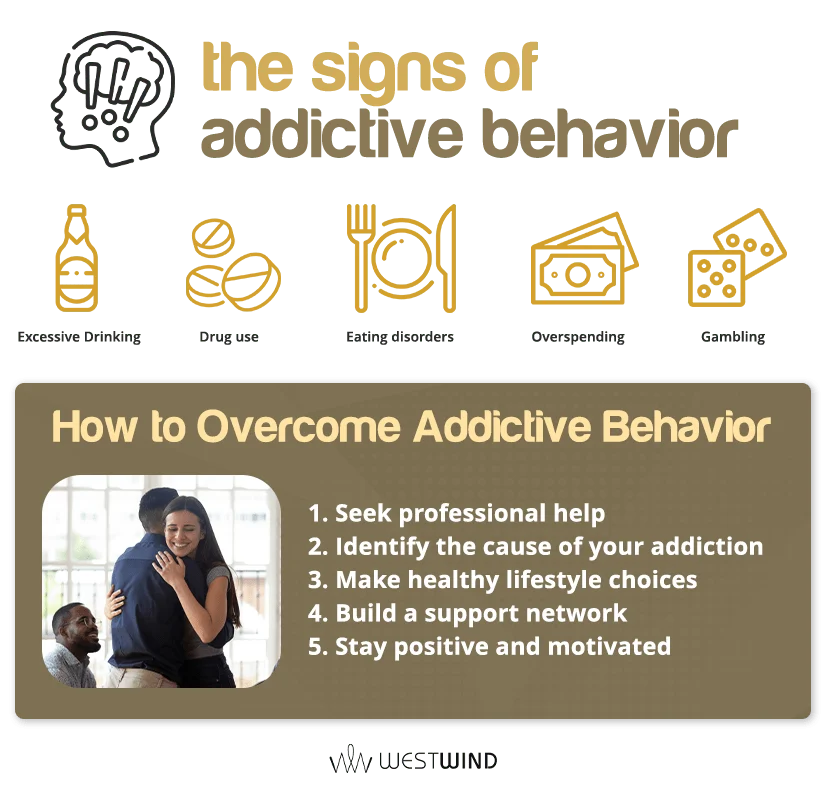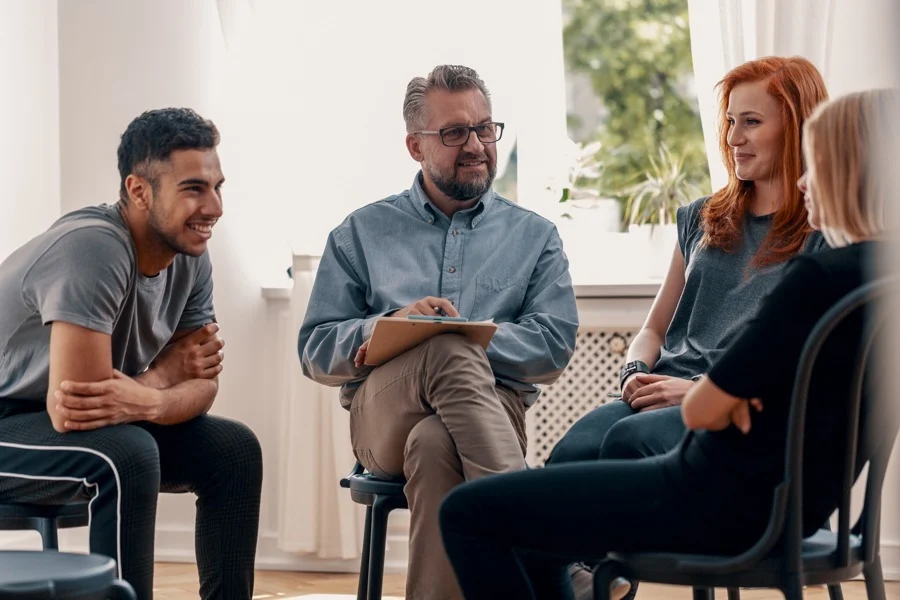Addictive behavior can be incredibly difficult to overcome, but it is not impossible. Here are a few tips to help you break the cycle of addiction and start living a healthier life.
How Do They Develop?
Addictive behavior usually develops over time. It may start with the occasional use of drugs or alcohol, but it can quickly become a compulsive need to use. There are many things that can contribute to addictive behavior, including genetics, environment, and psychological factors.
Addictive behavior can be very difficult to overcome on your own. If you are struggling with addiction, it is important to seek professional help. There are many treatment options available, and with the right combination of therapies, you can overcome your addiction and start living a healthier life.
What are the Signs of Addictive Behavior?

The signs of addictive behavior can vary from person to person, but some common symptoms include:
- Excessive drinking
- Drug use
- Overspending
- Gambling
- Eating disorders
- Excessive time on the Internet
Which Demographic is Affected Most by Addictive Behavior?
The demographics most affected by addictive behavior are typically people who are struggling with mental health issues, such as anxiety or depression. People who have a family history of addiction are also more likely to struggle with addiction themselves.
How Can I Identify Addictive Behavior?
If you are unsure whether or not your behavior is addictive, ask yourself the following questions:
- Do I feel like I need to engage in this behavior to function or feel happy?
- Do I feel like I’m addicted to this behavior?
- Is this behavior negatively impacting my life or the lives of those around me?
- Do I feel like I’m powerless to stop this behavior on my own?
How to Overcome Addictive Behavior
Addiction can be a difficult problem to overcome, but there is hope. There are many effective treatment options available that can help you get your life back on track. Addictive behaviors can include drinking, smoking, using drugs, eating unhealthy foods, and excessive spending.
If you answered yes to any of these questions, then it is likely that your behavior is addictive and you should seek professional help.
addiction is a complex condition that requires professional care. If you are struggling with addiction, it is important to seek out professional help from a qualified therapist or counselor. They will be able to provide you with the support and guidance you need to overcome your addiction.
addiction can be caused by many different factors, such as emotional trauma, social isolation, or low self-esteem. It is important to identify the root cause of your addiction and address it head-on. This can be challenging, but it is essential if you want to overcome your addiction.
addiction can be fueled by unhealthy habits and behaviors. In order to overcome addiction, it is important to make healthy lifestyle choices. This means eating a balanced diet, getting enough exercise, and getting adequate sleep.
addiction can be a lonely experience. It is important to build a support network of friends and family members who will support your recovery journey. These people can offer emotional support and practical advice when you need it most.
overcoming addiction is not easy, but it is possible. Be positive and motivated to stay on track. Remember that you are not alone in this journey. There is hope and support available to help you recover.
If you are struggling with addiction, please seek professional help. There are many treatment options available that can help you overcome addiction and live a healthy, fulfilling life.
What are the Risk Factors for Addictive Behaviors?
The risk factors of addictive behaviors can vary from person to person. Some of the most common risk factors include:
There is a strong genetic component to addictive behaviors. If you have a family history of addiction, you are more likely to develop an addiction yourself.
The environment in which you grow up can play a role in your likelihood of developing an addiction. If you live in a chaotic or stressful environment, you are more likely to develop an addiction.
People with certain personality traits, such as impulsiveness and low self-esteem, are more likely to develop addictions.
There are many ways to overcome addictive behavior. The most important thing is to seek professional help. There are several types of therapy that can help you overcome addiction, including cognitive-behavioral therapy, dialectical behavioral therapy, and motivational enhancement therapy.
If you are struggling with an addiction, it is important to reach out for help. Talk to your doctor or a therapist about your options for treatment. There is no shame in seeking help; in fact, it shows that you are brave enough to face your addiction head-on. Recovery is possible; you just need to take the first step.
What is the Continuum of Care?
The continuum of care refers to the range of services that are available to people who are struggling with addiction. The continuum of care includes prevention, early intervention, treatment, and recovery support services.
Prevention is the first step on the continuum of care. Prevention programs aim to keep people from developing addictions in the first place. Prevention programs teach kids how to resist peer pressure, how to deal with stress, and how to make healthy choices.
Early intervention is the second step on the continuum of care. Early intervention programs provide services to people who are at risk for addiction or who have already started using drugs or alcohol. Early intervention programs offer counseling, drug education, and support services to help people stop using drugs or alcohol.
Treatment is the third step on the continuum of care. Treatment programs provide services to people who are addicted to drugs or alcohol. Treatment programs offer counseling, drug education, and support services to help people stop using drugs or alcohol.
Recovery is the fourth step on the continuum of care. Recovery programs provide services to people who have stopped using drugs or alcohol. Recovery programs offer counseling, drug education, and support services to help people stay sober.
Prevention, early intervention, treatment, and recovery are all important parts of addiction care. If you or someone you know is struggling with addiction, please seek help from a professional. There are many resources available to you, including drug rehab centers and support groups like Alcoholics Anonymous and Narcotics Anonymous.
Addiction is a disease that can be treated. There are many resources available to you, including drug rehab centers and support groups like Alcoholics Anonymous and Narcotics Anonymous. If you or someone you know is struggling with addiction, please seek help from a professional.
Is There a Cure for Addictive Behaviors?
There is no cure for addictive behaviors, but there are many effective treatments. Treatment usually involves a combination of medication, therapy, and support groups.
What are the Symptoms of Addiction?
The symptoms of addiction vary from person to person. Some common symptoms include cravings for the drug or behavior, obsession with the drug or behavior, and inability to control how much or how often you use the drug or engage in the behavior.
Other Signs include:
- Increased risk-taking behavior
- Time spent recovering from substance use
- The decline in personal hygiene
- A decline in work/school performance
- Missing money and possessions
- Doctor shopping
- Mental health symptoms
- Social withdrawal
Addiction can creep up on you in the moments you least expect. It’s vital to reach within and discover what’s not serving your life. If you are experiencing any of the other symptoms listed above, you should also consider seeking help.
What are the Treatment Options to Overcome Addictive Behaviors?
There are many different treatment options for addiction. Some common treatments include:
- Detoxification
- Medication
- Residential and Outpatient Treatment
- Therapy
- Support groups
- Aftercare
- Partial Hospitalization
- Dual Diagnosis Treatment
- Case Management
How Can I Prevent Relapse?
Relapse prevention is a critical part of addiction treatment. There are many things you can do to help prevent relapse, including attending therapy sessions, participating in support groups, and avoiding triggers.
What Should I Do if I Experience a Relapse?
If you experience a relapse, it is not time to give up. It is time to recommit yourself to your treatment plan and seek help from your therapist or support group. Relapse is common, but it does not mean that you cannot overcome your addiction.
Support groups can also be helpful in overcoming addiction. These groups provide a safe and supportive environment where you can share your experiences and learn from others who are also struggling with addiction.
Finally, it is important to develop healthy coping mechanisms. This may include exercise, relaxation techniques, or positive self-talk. When you have healthy coping mechanisms in place, you will be less likely.
Are there alternative ways to overcome addictive behavior?
 There are alternative ways to overcome addictive behavior. One approach is to seek professional help. There are a variety of different therapies that can help you overcome addiction, including cognitive-behavioral therapy, motivational interviewing, and 12-step programs.
There are alternative ways to overcome addictive behavior. One approach is to seek professional help. There are a variety of different therapies that can help you overcome addiction, including cognitive-behavioral therapy, motivational interviewing, and 12-step programs.
Therapies can help you understand the root cause of your addiction and how to overcome it. Motivational interviewing helps you develop the motivation to change your behavior. 12-step programs provide support and guidance as you work to overcome addiction. Support groups can also be helpful in overcoming addiction. These groups provide a safe and supportive environment where you can share your experiences and learn from others who are also struggling with addiction.
Some people in recovery are opting for holistic addiction therapy. Holistics can be defined by treating the whole person with techniques such as acupuncture, massage therapy, reiki, meditation, and yoga. Despite the lack of evidence to prove its effectiveness, holistic addiction therapy can be used as a way to ease treatment without medications and improve patient retention.
When you have healthy coping mechanisms in place, you are less likely to turn to addiction as a way to cope with stress or difficult emotions. By following these steps, you can overcome addictive behavior and live a healthier and happier life. Learn about the incredible benefits of addiction therapy at Westwind Recovery®. Our facilities are primed to provide you with the tools necessary to push your life in a new direction. If you or someone you know is struggling with addiction, reach out to one of our facilities today.

Dr. Deena is the Chief Clinical Officer of Westwind Recovery®, an award-winning outpatient treatment center in Los Angeles where she oversees the clinical and administrative program and treatment methods. Dr. Deena is a doctor of psychology and licensed clinical social worker since 1993. LCSW #20628. Originally from the East Coast, Dr. Deena has worked running treatment centers, worked as a therapist in psychiatric hospitals as well as school settings and currently has a thriving private practice in the LA area. Dr. Deena has appeared regularly on the Dr. Phil Show as an expert since 2003. She has also been featured on many other TV shows, podcasts and has contributed to written publications as well as podcasts.




